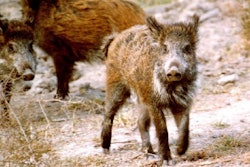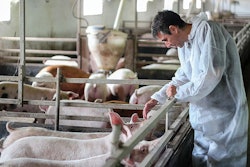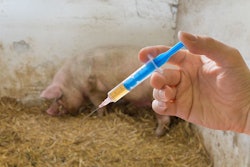
Over recent weeks, progress of the development of a vaccine against African swine fever has been made in Vietnam and the Philippines.
As African swine fever (ASF) continues its relentless spread across Europe, Africa and particularly Asia, there is a growing need for a safe and effective vaccine against the disease. This would help to protect domestic and wild pigs, which are the main hosts of the ASF virus. It poses no direct threat to human health. However, the devastating losses it brings can badly impact the owners’ livelihoods, disrupt supply chains and raise the price of pork.
Last week, Vietnam Plus reported that not one but two ASF vaccines are scheduled to be authorized in that country by the end of this year.
After successful farm trials this year, AVAC Vietnam Co. and Dabaco Group each have a vaccine that is expected to receive a license this year.
Vietnam is among the Asian countries in greatest need for additional measures to control ASF.
In early 2019, the virus was first detected in the country, and it spread to all 63 of the nation’s provinces and cities, this source reports. More than six million pigs were culled, and costs have topped an estimated VND30 trillion (US$1.3 million).
Although infrequently reported, ASF continues to cause significant losses in Vietnamese pig herds. For the first three months of this year, 562 outbreaks were confirmed in 42 of the country’s provinces. This is according to the latest update on the ASF situation in Asia from the United Nations’ Food and Agriculture Organization.
Recently, Vietnam authorized the commercial sale of NAVET-ASFVAC. Development of this — the world’s first vaccine against ASF — was begun in early 2022 by Navetco National Veterinary JSC in collaboration with U.S. experts. According to Vietnam Plus, lab trials of this vaccine revealed it protected at least 80% of pigs for six months.
In the U.S., an ASF vaccine candidate has recently passed important safety tests as part of its regulatory progress.
Philippines: more cases, vaccine testing
Within the past month, the Philippines has also reported that testing of an ASF vaccine there had shown positive results.
In May, the Philippine News Agency (PNA) reported that the vaccine is moving on to the next phase of testing. For this stage, vaccinated pigs will be moved to pens containing ASF-infected materials. Preliminary results are expected at the end of this month, according to trial organizers, the Department of Agriculture and Robina Corp.
At the end of the month, the same source reported that the nation’s Department of Science and Technology (DOST) and a U.S. Embassy scientist are exploring opportunities to collaborate over ASF diagnostics. Aims of this cooperation are to improve detection kits and make them cheaper.
According to PNA, a mobile lab has been deployed in Mindanao to support efforts to control the spread of ASF. Speeding up testing of suspected cases should lead to fewer animals culled.
Rising cost of pork is the main driver for the efforts to control ASF in the Philippines, according to one DOST official.
In the Philippines, 12 communities had active cases of ASF last month.
Latest official reports from the national veterinary authority outline a further 250 new cases of ASF at 86 locations. This is according to recent notifications to the World Organisation for Animal Health (WOAH).
Of these latest outbreaks, 66 occurred in nine Mindanao provinces, and 20 in 10 provinces on Luzon. All were confirmed between March 1 and April 8, and affected village pig herds. They take the number of outbreaks in these two regions to more than 850, with more than 482,000 pigs directly impacted.
First ASF cases in Nepal
Nepal has reported its first ever cases of ASF.
Since the end of March, the virus has been detected at 10 locations, according to notifications to the WOAH. All were in Bagmati province — in nine municipalities. So far, a total of 5,167 pigs have been directly impacted by the outbreaks, including 3,370 mortalities.
Authorities have attributed the spread of the virus to swill feeding.
South Korea reports more ASF cases in wild boar
Between mid-April and May 9, 63 more wild boar tested positive for the ASF virus in South Korea. Found in the provinces of Gangwon, North Chungcheong and Gyeonggi, they bring to 1,022 the number of virus-positive animals reported to the OIE.
On May 21, the first cases in South Korea’s domestic pigs of this year were reported. Affected was a farm with 1,175 animals in Gangwon. This province is in the north of the country.
At the end of May, Pig People of South Korea reported that new cases of ASF in wild boar had slipped from the nation’s news headlines. So far this year, the number of confirmed cases — already at 738 — looks likely to pass the 2021 total of 964 cases.
Total cases in South Korean wild boar has reached 2,619, according to this source (as on June 7).
Further ASF cases confirmed in Bhutan, Thailand
Since ASF returned to Bhutan in mid-April, the number of pigs affected has risen to 1,008. According to recent WOAH reports, this includes 423 more animals that were involved in depopulation at the one outbreak site. This is a village in the Chukha district, near to the border with the Indian state of West Bengal.
In November 2021, Thailand confirmed its first cases of ASF.
Based on the latest notifications to WOAH, the number of confirmed outbreaks has reached 89, with more than 820 cases among 2,864 pigs. All of these are reported to be in non-commercial herds.
The three most recent outbreaks to be registered with WOAH started during the first half of May. While two affected herds were in southern provinces, the other was in Northeastern Thailand.
Local media report outbreaks in 3 Indian states
While WOAH has not been notified of the ASF situation on India, local media continue to report widespread outbreaks in the northeast of the country.
In the state of Mizoram, the situation is described as “disastrous,” according to India Today. ASF has been blamed for the deaths of more than 37,000 pigs there, and the chief minister is reported to be preparing to declare a state of emergency. Since the first cases in March 2021, outbreaks have affected more than 50 villages in seven districts of Mizoram. A further 14,000 animals have been culled as part of the efforts to curb the spread of infection.
Over the past week, an outbreak has occurred in neighboring Manipur state – also in the northeast of India. Around 80 pigs were culled at the farm, which is in the Kamjong district, reports Hindustan Times. As investigations are underway to establish the source of infection, movements of pigs and their products in the area are banned.
Meanwhile, all pig movements were banned at the end of May in Sikkim. Indian Express reported that these measures were introduced after ASF was detected in this state. In various districts of North Sikkim, 117 pigs were reported to have died of ASF over the previous two months.
Taiwan on ASF alert
Ahead of a major festival last week, Taiwan’s authorities stepped up measures to stop incoming pork products.
According to Focus Taiwan, the Dragon Boat Festival is marked by the giving of gifts. Up to the end of May, the territory’s customs service had seized almost 240 kilograms of illegal pork so far this year. Around half of these parcels were from China (including Hong Kong). Of the 226 parcels seized, 28 had tested positive for the ASF virus.
While inspections of mailed parcels and imported goods are stepped up, Taiwan’s authorities remind travelers and citizens that bringing pig products into the territory is illegal, and significant fines will be imposed.
ASF situation in China widely resolved
Over recent days, China’s veterinary agency has declared to WOAH that 15 earlier ASF outbreak series have been “resolved.”
Covering 14 provinces and special regions were a total of 39 confirmed outbreaks. Directly impacted were almost 55,000 pigs. Of these now-closed outbreaks, the first was in October 2018 in Shanxi province. December 2021 was the last of the closing dates for these disease series, after single outbreaks in Hainan and Hebei.
Of all the outbreaks, 14 were detected on premises described as farms in WOAH notifications. Individual affected herds ranged in size from 165 to almost 10,000 swine. While there were four such outbreaks in the Xinjiang Uyghur region, seven more provinces each reported just one or two outbreaks. Also testing positive for the ASF virus over this period were nine backyard herds in five provinces.
Fifteen were detected at highway checkpoints and quarantine facilities in six provinces/regions. These had been set up by authorities to prevent the spread of the ASF virus around the country in infected pigs.
Finally, one outbreak in Jiangsu province in April 2020 affected 17 pigs at a premises described as “other.”
ASF detected in Hong Kong wild pig
In Hong Kong, a new outbreak series has begun in wild boar.
According to the official WOAH notification, one sick boar reported by the public was found dead in the Sai Kung area at the end of May. Among the pig farms put under close monitoring was one within 3 kilometers of the infected carcass.
Between September 2021 and February, a total of nine wild pigs tested positive for the ASF virus at three other locations in the Hong Kong area.
View our continuing coverage of the global African swine fever situation.


















